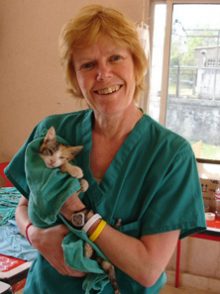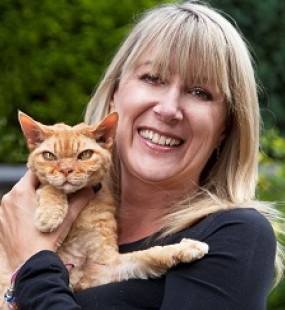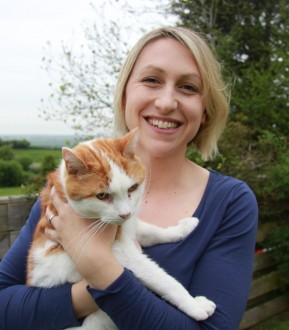"caring for cats"

Recorded Webinars
Back in 2018 Feline Friends launched its series of free webinars for cat owners/carers and vets. We brought some of the worlds’ leading veterinary experts together with cat lovers seeking to learn more about our feline companions and their welfare requirements.
The webinars were recorded and these are available below. We hope that they will continue to bring cat lovers a greater insight into how they might endeavour to help their feline friends lead full and healthy lives. We also hope that a more informed dialogue between vet and caring client will result.
List Of Webinars By Subject:
…………………………………………
Making a cat’s golden years good
Live webinar date : 12th February 2020 8pm
Advances in veterinary medicine has increased the life expectancy of cats. However, we must ensure that they enjoy this extra time. With age, the function of major body organs such as the kidneys, heart, joints and brain deteriorate. The special senses including smell and vision also decline. Although we cannot stop the clock on ageing, we can support an ageing cat if we anticipate and monitor these changes. When working as a team, veterinarians and owners can enhance these golden years and assist their cat with “the activities of daily living”.
Learning objectives
– To understand the main changes that happen as cats age
– To learn what is normal in a senior or geriatric cat
– To learn what is abnormal in a senior or geriatric pet
– To understand why regular veterinary checks are vital to maintaining an older cat’s quality of life
– To understand why mental and physical health are both important to a cat’s overall well-being
– To learn how to help our feline friends navigate their golden years
Speaker: Sheilah A Robertson BVMS (Hons), PhD, DACVAA, DECVAA, DACAW, DECAWBM (WSEL), CVA, MRCVS.
 Dr. Sheilah Robertson graduated from the University of Glasgow in Scotland. Following time in private practice and a surgery internship she undertook specialized training in anesthesia and completed her PhD at the University of Bristol. She is board certified in anesthesia and in animal welfare by the respective American and European Colleges and holds a certificate in small animal acupuncture. In 2014 she completed her graduate certificate in Shelter Medicine at the University of Florida. In 2019 she received her certification as a Traditional Chinese Veterinary Medicine Palliative and End-of-Life practitioner by the Chi Institute of Chinese Medicine. She has published widely on the recognition and alleviation of pain in cats. Currently she is the senior medical director of Lap of Love Veterinary Hospice, a large network of veterinarians dedicated to end-of-life care and in-home euthanasia throughout the USA. Dr Robertson is also a courtesy Professor in the Department of Small Animal Clinical Sciences, University of Florida, Gainesville, Florida.
Dr. Sheilah Robertson graduated from the University of Glasgow in Scotland. Following time in private practice and a surgery internship she undertook specialized training in anesthesia and completed her PhD at the University of Bristol. She is board certified in anesthesia and in animal welfare by the respective American and European Colleges and holds a certificate in small animal acupuncture. In 2014 she completed her graduate certificate in Shelter Medicine at the University of Florida. In 2019 she received her certification as a Traditional Chinese Veterinary Medicine Palliative and End-of-Life practitioner by the Chi Institute of Chinese Medicine. She has published widely on the recognition and alleviation of pain in cats. Currently she is the senior medical director of Lap of Love Veterinary Hospice, a large network of veterinarians dedicated to end-of-life care and in-home euthanasia throughout the USA. Dr Robertson is also a courtesy Professor in the Department of Small Animal Clinical Sciences, University of Florida, Gainesville, Florida.
Feline Vaccination: What you Need to Know
Feline Vaccination: What you Need to Know
Live webinar date : 22nd January 2020 8pm
The widespread use of effective vaccinations against common infections has had a huge positive impact on the health of pet cats around the world. Continued appropriate use of vaccinations helps to keep individual cats well and also reduces the level of infectious agents in the cat population, so improving the welfare of unvaccinated and unowned cats. In the UK it is recommended that all cats should be regularly vaccinated against the cat flu viruses (Feline Herpesvirus and Feline Calicivirus) and against Feline Panleukopenia Virus. Additional cover against Feline Leukaemia Virus is also recommended for any cats that might be in danger of coming into contact with this virus.
However, as vaccines have become more widely used around the world, concerns have mounted regarding the potential for adverse effects. In general, adverse reactions to vaccines are rare, and are usually mild and short-lived, but it is now well-recognised that some cats can develop a malignant cancer (Feline Injection Site Sarcoma) at sites where they have had an injection, and that vaccines can be a cause of this. Reducing the number of vaccines given to an individual cat through its lifetime may help to reduce the risk of an adverse reaction, so recently there has been increased interest in finding ways to tailor a cat’s vaccinations more specifically to its individual needs, rather than to adopt a “one size fits all”, “every vaccine every year” approach.
This webinar will review the vaccines that are commonly used in the UK – what they do, how well they work, and how long they last.
Learning objectives
– Understand the benefits of vaccinations against cat flu, feline panleukopenia and feline leukemia viruses and how well each vaccine works
– Know the difference between “live” and “killed” vaccines, their advantages and limitations
– Know how long the immunity from different vaccines lasts and how frequently they should be repeated
– Feline Injection Site Sarcoma – know what to look for, when to worry and what to do.
Speaker : Martha Cannon BA, VetMB, DSAM(fel), MRCVS
 Martha is an RCVS Specialist in Feline Medicine and the co-founder of the Oxford Cat Clinic. She is passionate about cats, and not long after graduating from Cambridge University she gained the RCVS Certificate in Small Animal Medicine. In 2002 Martha gained the RCVS Diploma in Small Animal Medicine (Feline), and attained RCVS Recognised Specialist Status.
Martha is an RCVS Specialist in Feline Medicine and the co-founder of the Oxford Cat Clinic. She is passionate about cats, and not long after graduating from Cambridge University she gained the RCVS Certificate in Small Animal Medicine. In 2002 Martha gained the RCVS Diploma in Small Animal Medicine (Feline), and attained RCVS Recognised Specialist Status.
Feline hypertension (high blood pressure): key facts for carers
Feline hypertension (high blood pressure): key facts for carers
Live webinar date : 11th December 2019 8pm
Feline hypertension (high blood pressure) is a common problem, especially in older cats where it is estimated to affect around 20% of senior cats (cats aged 11 years and over). Often hypertension is diagnosed in association with another illness. It is estimated that up to 60% of cats with chronic kidney disease and up to 20% of cats with hyperthyroidism develop systemic hypertension. Fortunately it is a very manageable condition with most cats doing extremely well following treatment.
Learning objectives
– What feline hypertension is and the damaging consequences that it can cause to the heart, kidneys, brain and eyes
– When hypertension should be screened for as part of lifestage appropriate health checks
– How to recognise hypertension as a carer
– When vets worry about hypertension and how vets diagnose hypertension
– How feline hypertension is treated
Speaker : Sarah M. A. Caney BVSc PhD DSAM(Feline) MRCVS, RCVS
 Specialist in Feline Medicine. Sarah Caney is an internationally recognised specialist in feline medicine who has worked as a feline-only vet for more than twenty years. She trained as a specialist at the University of Bristol and is one of twelve recognised specialists in feline medicine working within the UK. Sarah has written or co-written four books published by her business Vet Professionals (www.vetprofessionals.com) including ‘Caring for an elderly cat’. Sarah conducts online owner surveys and has published much of her research results in the Journal of Feline Medicine and Surgery.
Specialist in Feline Medicine. Sarah Caney is an internationally recognised specialist in feline medicine who has worked as a feline-only vet for more than twenty years. She trained as a specialist at the University of Bristol and is one of twelve recognised specialists in feline medicine working within the UK. Sarah has written or co-written four books published by her business Vet Professionals (www.vetprofessionals.com) including ‘Caring for an elderly cat’. Sarah conducts online owner surveys and has published much of her research results in the Journal of Feline Medicine and Surgery.
Intestinal parasites of cats : Not just the usual suspects
Live webinar date : 19th November 2019 8pm
When we think of intestinal parasites in cats, we tend to picture roundworms and tapeworms. While it is important to control these parasites for human and pet health, there is a wide range of more unusual parasites that live in the small and large intestine including Giardia, Tritrichomonas and Toxoplasma, potentially leading to disease and human health risk. With just a few simple preventative measures however, these risks can be greatly reduced and a close loving relationship with your cat maintained. This webinar will discuss common intestinal parasites of UK cats, the health risks they pose and their prevention.
Learning objectives
– To be familiar with common intestinal parasites of cats
– To understand the health risks they pose to cats and humans
– To recognise common clinical signs in cats associated with intestinal parasite infection
– To understand the link between fleas and tapeworms in cats
– To be able to implement simple preventative measures to help keep pets and owners safe
Speaker : Ian Wright BVMS, MSc, MRCVS
 Ian is a practising Veterinary surgeon and co-owner of the Mount Veterinary Practice in Fleetwood. He has a Master’s degree in Veterinary Parasitology, is head of the European Scientific Counsel of Companion Animal Parasites (ESCCAP) UK & Ireland and guideline director for ESCCAP Europe.
Ian is a practising Veterinary surgeon and co-owner of the Mount Veterinary Practice in Fleetwood. He has a Master’s degree in Veterinary Parasitology, is head of the European Scientific Counsel of Companion Animal Parasites (ESCCAP) UK & Ireland and guideline director for ESCCAP Europe.
Feline Urinary Tract Disorders
Feline Lower Urinary Tract Disorders: Metabolism and Stress
Live webinar date : 23rd October 2019 8pm
Lower urinary tract disorders are common in cats. In previous decades, the focus of study has been on causes and management of crystalluria. More recently it has become clear that the majority of cases of LUTD are idiopathic and the bladder may be the victim, rather than the initiator of the clinical signs. This presentation looks at the Pandora Syndrome, the roles of metabolism and of stress.
Learning objectives
– The Pandora Syndrome
– How stress affects metabolism
– The Five Freedoms
– How to assess and meet the environmental needs of cats
– To recognize the signs of cystitis in cats
– What we understand about the many causes/types of cystitis in cats
– How stress affects metabolism
– What tests your veterinarian will need to runHow to treat different types of cystitis in cats
– How to assess and meet the environmental needs of cats
Speaker : Margie Scherk DVM, Dip ABVP
 Margie became board certified in feline practice by the American Board of Veterinary Practitioners in 1995, recertifying in 2004. After many years of serving on the Board of the American Association of Feline Practitioners she was honoured to be its President in 2007. An active international speaker, Dr. Scherk has authored numerous book chapters and scientific papers and is the North American editor for the Journal of Feline Medicine and Surgery.
Margie became board certified in feline practice by the American Board of Veterinary Practitioners in 1995, recertifying in 2004. After many years of serving on the Board of the American Association of Feline Practitioners she was honoured to be its President in 2007. An active international speaker, Dr. Scherk has authored numerous book chapters and scientific papers and is the North American editor for the Journal of Feline Medicine and Surgery.
Choosing a cat food for your cat
Live webinar date : 4th September 2019 8pm
There is no one right diet for all cats. The basic requirements are to be nutritionally complete and balanced and safe. The diet should be appropriate for lifestage, activity and body condition. It is difficult to determine petfood quality from the label, which has legally regulated information. Some terms, e.g. holistic, are meaningless. Larger companies’ petfoods are often backed by research and extensive quality control. Some diets include “functional foods” such as anti-oxidants, or omega-3 fatty acids. Commercial diets may include meat derivatives from animals slaughtered for human consumption. Homemade diets are frequently nutritionally incomplete, and raw feeding has risks.
Learning objectives
– Understand the term “complete and balanced”
– Know the lifestages of cats and how nutrition affects them
– Be able to body condition score your cat
– Understand the information on a catfood label, including the types of ingredients used in cat foods
– Understand the risks of homemade and raw foods
Speaker : Marge Chandler DVM, MS, MANZCVS, DACVN, DACVIM, MRCVS
 Marge is a Clinical Nutritionist at Vets Now Referrals (Glasgow) and a private consultant in small animal medicine and nutrition. She is a diplomate of the American College of Veterinary Nutrition and of the American College of Veterinary Internal Medicine (Small Animal Medicine).
Marge is a Clinical Nutritionist at Vets Now Referrals (Glasgow) and a private consultant in small animal medicine and nutrition. She is a diplomate of the American College of Veterinary Nutrition and of the American College of Veterinary Internal Medicine (Small Animal Medicine).
Infectious diseases in cats
Live webinar date 27th March 2019 8pm
Your cat can get quite a range of infectious diseases. Some of them are very serious and others may last a long time. Your cat wants you to know about the common and/or important diseases and what you can do to help in their recovery. This talk will focus on cat ‘flu, which is probably the most common but least serious of these infections and feline immunodeficiency virus infection, which is one of those diseases that many cats can live with pretty well for a long time. The talk will briefly cover feline infectious peritonitis and feline leukaemia virus as well. There will be 15 minutes at the end to answer any questions.
Learning objectives
– See the range of infections that cats can get but understand that how we keep cats has a major role to play in the number of infections that a cat develops
– Know the signs of cat ‘flu and how to treat them
– Understand why your cat needs you to ask the vet to find out what is the cause of the cat ‘flu
– Know about the best ways of looking after cats with feline immunodeficiency virus
– Know about feline leukaemia virus and feline infectious peritonitis
Speaker: Ian Ramsey
 Ian Ramsey is Professor of Small Animal Medicine at Glasgow University and an RCVS and European Recognised Specialist in Small Animal Medicine. He has lectured and published extensively on many aspects of small animal medicine but his main interest is endocrinology. He is the editor of the BSAVA Canine and Feline Formulary and was awarded the BSAVA Woodrow Award for contributions to small animal medicine in 2015.
Ian Ramsey is Professor of Small Animal Medicine at Glasgow University and an RCVS and European Recognised Specialist in Small Animal Medicine. He has lectured and published extensively on many aspects of small animal medicine but his main interest is endocrinology. He is the editor of the BSAVA Canine and Feline Formulary and was awarded the BSAVA Woodrow Award for contributions to small animal medicine in 2015.
Kidney disease in cats
Live webinar date : 27th February 2019 8pm
Chronic kidney disease in cats: advances in diagnosis and management. Chronic kidney disease (CKD) is one of the most common illnesses affecting older cats and is estimated to affect more than one third of cats aged 11 years and over. Typical clinical signs include weight loss in association with a variable/poor appetite, an increase in thirst, sometimes vomiting/nausea and vague signs of ill health: your cat just not being quite right. Diagnosis requires collection of blood and urine samples for analysis. CKD is a progressive condition – it will get worse with time – but thanks to advances in our understanding of this condition, it is now possible to successfully manage most cases of CKD for several years following diagnosis. One of the most important management strategies is feeding a food that is low in phosphate as this has been proven to improve quality and length of life for cats with CKD. Sarah will explain more about all of the treatment options in her presentation with some practical tips for supporting cats with CKD at home.
Learning objectives
– What is chronic kidney disease and how does it impact on my cat’s health
– How is CKD diagnosed
– What are the management options
– How can a carer support their cat with CKD at home
– What is the longterm outlook for cats with CKD
Speaker: Sarah Caney
 Dr Sarah Caney, CEO of Vet Professionals has worked as a feline-only vet for more than twenty years. She is a University of Bristol graduate and also completed her feline medicine residency and PhD at this institution. Sarah has always enjoyed seeing a mixture of first opinion and referral feline medicine patients and has a particular interest in geriatric feline medicine. Sarah is internationally recognised as one of only thirteen veterinary specialists in feline medicine working in the UK. Sarah founded Vet Professionals in 2009 and has authored and co-authored a number of the Vet Professionals ‘Caring for a cat’ series of books. Sarah has published widely in prestigious international journals and has been an invited speaker to veterinary conferences around the world.
Dr Sarah Caney, CEO of Vet Professionals has worked as a feline-only vet for more than twenty years. She is a University of Bristol graduate and also completed her feline medicine residency and PhD at this institution. Sarah has always enjoyed seeing a mixture of first opinion and referral feline medicine patients and has a particular interest in geriatric feline medicine. Sarah is internationally recognised as one of only thirteen veterinary specialists in feline medicine working in the UK. Sarah founded Vet Professionals in 2009 and has authored and co-authored a number of the Vet Professionals ‘Caring for a cat’ series of books. Sarah has published widely in prestigious international journals and has been an invited speaker to veterinary conferences around the world.
Multi-cat Households (how to help cats live harmoniously together)
Live webinar date 23rd January 2019 8pm
Cats vary greatly in their level of sociability – some can cohabit with others in perfect harmony while many find it much more challenging, even impossible. This talk will discuss how to “diagnose” problems between cats (not always obvious to the untrained eye) and where to go for help. It also looks at prevention, showing how owners can reduce the chances of conflict by ensuring that every care is taken to choose compatible individuals and introduce them carefully. This talk also discusses the home environment and what owners should provide to meet the needs of all their cats.
Learning objectives:
This talk will help owners to:
– Identify subtle signs of distress and conflict
– Create a “social map” to understand social grouping in their own multicat household
– Introduce new cats or kittens gradually to ensure the best possible chance of success
– List the five broad areas that owners need to focus on to ensure their cats’ environmental needs are met in the home
– Know when to seek help with conflict between cats
Speaker: Vicky Halls
 Vicky Halls is a Registered Veterinary Nurse and full member of the Association of Pet Behaviour Counsellors, consulting all over the UK as a feline specialist. She is an enthusiastic supporter of the charity International Cat Care, working with them on various behaviour and welfare projects. She is a regular contributor to television, radio and specialist publications. Vicky is also a qualified person-centred counsellor and registered member of the British Association of Counsellors and Psychotherapists. Vicky is the author of a number of bestselling books (Cat Confidential, Cat Detective, Cat Counsellor, The Complete Cat, The Secret Life of Your Cat and The Bluffer’s Guide to Cats) and co-author of a number of veterinary textbooks. She was voted The Nation’s Favourite Cat Behaviour Author in the UK. Her particular interest is the complexity of the modern cat/owner relationship.
Vicky Halls is a Registered Veterinary Nurse and full member of the Association of Pet Behaviour Counsellors, consulting all over the UK as a feline specialist. She is an enthusiastic supporter of the charity International Cat Care, working with them on various behaviour and welfare projects. She is a regular contributor to television, radio and specialist publications. Vicky is also a qualified person-centred counsellor and registered member of the British Association of Counsellors and Psychotherapists. Vicky is the author of a number of bestselling books (Cat Confidential, Cat Detective, Cat Counsellor, The Complete Cat, The Secret Life of Your Cat and The Bluffer’s Guide to Cats) and co-author of a number of veterinary textbooks. She was voted The Nation’s Favourite Cat Behaviour Author in the UK. Her particular interest is the complexity of the modern cat/owner relationship.
Hyperthyroidism
Live webinar date: 19th December 2018 8pm
Feline hyperthyroidism: what is this and how can it be managed? Hyperthyroidism is the medical term for an over-active thyroid gland and is a condition which is estimated to affect around 10% of cats over the age of ten years. The most common clinical signs of hyperthyroidism are weight loss in spite of a normal, or even increased, appetite although other clues of this illness such as behavioural changes (irritability, hyperactivity, vocalising more – especially at night), gastrointestinal signs (vomiting, diarrhoea) and coat changes may also be seen. There are a number of treatment options including some curative possibilities (surgical removal of the thyroid or radioiodine) and reversible/long-term options such as anti-thyroid medication or an iodine-restricted food. The outlook for cats affected by this condition is usually very good. Most cats suffering from hyperthyroidism can be successfully stabilised and live for many years following diagnosis. Sarah will include some typical cases in her presentation so that listeners can learn more about this condition and how to recognise it in their cat.
Learning objectives
– What are the common and typical clinical signs of hyperthyroidism in cats
– What clues does a vet look for when examining a cat that may have hyperthyroidism
– What tests might be needed to confirm a diagnosis of hyperthyroidism
– What are the different treatment options for hyperthyroidism
– What is the long-term outlook for a cat diagnosed with hyperthyroidism
Speaker: Sarah Caney
 Dr Sarah Caney, CEO of Vet Professionals has worked as a feline-only vet for more than twenty years. She is a University of Bristol graduate and also completed her feline medicine residency and PhD at this institution. Sarah has always enjoyed seeing a mixture of first opinion and referral feline medicine patients and has a particular interest in geriatric feline medicine. Sarah is internationally recognised as one of only thirteen veterinary specialists in feline medicine working in the UK. Sarah founded Vet Professionals in 2009 and has authored and co-authored a number of the Vet Professionals ‘Caring for a cat’ series of books. Sarah has published widely in prestigious international journals and has been an invited speaker to veterinary conferences around the world.
Dr Sarah Caney, CEO of Vet Professionals has worked as a feline-only vet for more than twenty years. She is a University of Bristol graduate and also completed her feline medicine residency and PhD at this institution. Sarah has always enjoyed seeing a mixture of first opinion and referral feline medicine patients and has a particular interest in geriatric feline medicine. Sarah is internationally recognised as one of only thirteen veterinary specialists in feline medicine working in the UK. Sarah founded Vet Professionals in 2009 and has authored and co-authored a number of the Vet Professionals ‘Caring for a cat’ series of books. Sarah has published widely in prestigious international journals and has been an invited speaker to veterinary conferences around the world.
The Diabetic Cat: more than just insulin injections
Live webinar date: 28th November 2018 8pm
A diagnosis of diabetes can be a daunting prospect for many owners. It is a serious illness, but can be treated very effectively, using a combination of insulin and diet. This webinar will discuss the causes, diagnosis and management of diabetes, guiding owners of diabetic cats on what to expect and how to optimise treatment and in some cases, help their cat into remission from the disease. The webinar will also cover ways cat owners can, in some cases, prevent their cat developing diabetes.
Learning objectives
– Identify the signs a cat may be suffering from diabetes, e.g. drinking and urinating more, weight loss despite a good appetite.
– Discuss the diagnosis of diabetes and the problem caused by stress induced high blood glucose in the veterinary clinic
– Understand the management of diabetes, including the types of insulin available and how they are used along with diet.
– Understand how diabetic cats are monitored while on treatment, and that some cats can go into remission and not require further insulin treatment.
– Explain the causes and therefore prevention of diabetes, for example obesity and the use of some medications.
 Sam Taylor graduated from the Royal Vet College in 2002 and completed internships in private referral practice before starting a Feline Advisory Bureau Residency at Bristol University. She was awarded the RCVS Certificate in Small Animal Medicine in 2006 and the European Diploma in Veterinary Internal Medicine in 2009. In 2011 she became an RCVS Recognised Specialist in Feline Medicine. As well as working in clinical referral practice at Lumbry Park Veterinary Specialists, she works for International Cat Care specifically involved in distance learning and nursing education, and edits the monthly journal Feline Focus. She is also involved in veterinary further education via the International Society for Feline Medicine as well as lecturing nationally and internationally. She is an editorial board member for The Journal of Feline Medicine and Surgery, and has authored 2 books and numerous book chapters as well as publishing a number of papers on both canine and feline internal medicine.
Sam Taylor graduated from the Royal Vet College in 2002 and completed internships in private referral practice before starting a Feline Advisory Bureau Residency at Bristol University. She was awarded the RCVS Certificate in Small Animal Medicine in 2006 and the European Diploma in Veterinary Internal Medicine in 2009. In 2011 she became an RCVS Recognised Specialist in Feline Medicine. As well as working in clinical referral practice at Lumbry Park Veterinary Specialists, she works for International Cat Care specifically involved in distance learning and nursing education, and edits the monthly journal Feline Focus. She is also involved in veterinary further education via the International Society for Feline Medicine as well as lecturing nationally and internationally. She is an editorial board member for The Journal of Feline Medicine and Surgery, and has authored 2 books and numerous book chapters as well as publishing a number of papers on both canine and feline internal medicine.
Is my cat itchy?
Live webinar date: 31st October 2018 8pm
Cats commonly suffer from skin disease. During the webinar we will discuss how to recognise the various skin patterns and how to know if your cat is itchy. Common causes of skin disease will be discussed and how we can treat these.
Learning objectives
– How do cats display itchiness
– What are the different type of skin lesions
– What are the different causes of disease
– What treatments are available
– You will learn about the lifecycle of the flea
Speaker: Anthony Chadwick
 Anthony Chadwick is the CEO of Alpha Vet International and is a veterinary dermatologist. Anthony qualified from Liverpool University in 1990 and achieved his CertVD in 1995. Anthony set up a practice in Liverpool in 1997 in Liverpool which he eventually sold in 2011 so that he could concentrate on The Webinar Vet which he started in January 2010. The Webinar Vet is the largest online provider of veterinary CPD in Europe and is a past winner of the FSB’s NW online business of the year and The Regional Business Awards’ Knowledge Business of the year. Anthony is also a veterinary futurist and is fascinated about new technology in the veterinary profession. At a futurist conference in 2016, he heard about the hololens and immediately set about developing Sheba, the holographic GSD which he demonstrated at that year’s London Vet Show. Anthony enjoys thinking strategically and connecting teams together- an ideal quality for project managing multi-disciplinary teams.
Anthony Chadwick is the CEO of Alpha Vet International and is a veterinary dermatologist. Anthony qualified from Liverpool University in 1990 and achieved his CertVD in 1995. Anthony set up a practice in Liverpool in 1997 in Liverpool which he eventually sold in 2011 so that he could concentrate on The Webinar Vet which he started in January 2010. The Webinar Vet is the largest online provider of veterinary CPD in Europe and is a past winner of the FSB’s NW online business of the year and The Regional Business Awards’ Knowledge Business of the year. Anthony is also a veterinary futurist and is fascinated about new technology in the veterinary profession. At a futurist conference in 2016, he heard about the hololens and immediately set about developing Sheba, the holographic GSD which he demonstrated at that year’s London Vet Show. Anthony enjoys thinking strategically and connecting teams together- an ideal quality for project managing multi-disciplinary teams.
Subject : A glimpse of feline fangs
Live webinar date: 27th June 2018, 8pm
The cat has a unique oral anatomy, with teeth highly adapted for prey capture. Just like humans, cats also suffer from a range of dental diseases, which can often result in pain, discomfort and infection. This talk will briefly introduce some of the dental problems that cats suffer with and consider options for homecare, a.k.a toothbrushing.
Learning objectives
– Understand the anatomy of the different type of cat teeth
– Understand the prevalence and signs of periodontal disease in the cat
– Appreciate other common problems affecting cat teeth, such as resorption
– Understand how to introduce toothbrushing at home
– Appreciate what equipment and skills your vet requires to perform good standards of feline dentistry
Speaker : Rachel Perry
 Rachel graduated as a veterinary surgeon from Edinburgh University in 1997, and entered small animal practice. She soon developed an interest in small animal dentistry. Since 2010 her practice has been limited to small animal dentistry and oral surgery, and she provides first opinion and referral services in the south east. In 2016 she passed the European Veterinary Dental College Board examinations to become a Diplomate and European Veterinary Specialist in veterinary dentistry. She was granted RCVS Specialist status in 2017.
Rachel graduated as a veterinary surgeon from Edinburgh University in 1997, and entered small animal practice. She soon developed an interest in small animal dentistry. Since 2010 her practice has been limited to small animal dentistry and oral surgery, and she provides first opinion and referral services in the south east. In 2016 she passed the European Veterinary Dental College Board examinations to become a Diplomate and European Veterinary Specialist in veterinary dentistry. She was granted RCVS Specialist status in 2017.
She has lectured nationally and internationally and published original research and review articles in journals, textbooks and is regularly involved in online and in-house teaching for nurses and vets across the country. The main species she treats are cats and dogs, but she has also treated tigers, cheetahs, bears, leopards, marmosets, fossas and vicuñas!
Subject : Desperate housecats? The indoor/outdoor debate
Live webinar date: 23rd May 2018, 8pm
The majority of pet cats in the UK are allowed outdoors but, in many countries, the trend is towards indoor living, for example in the USA between 50 and 60% are housed indoors. As this represents an unnatural life for the species, owners have to work harder to fulfill the needs of their pets. Indoor living is often associated with increased risk of obesity and cats kept indoors have been shown to have more behaviour problems than those with outdoor access.
This presentation will look at the relative pro’s and con’s of both the indoor and outdoor options but introduces many other factors to consider, . The presentation will look at Vicky’s own cat behaviour referral caseload to identify whether this confirms there is a correlation between the development of behavioural problems and an indoor lifestyle, with surprising results which illustrate how this is definitely not a black and white scenario.
One of the significant factors that this presentation also considers is the impact that the owner’s attitudes and beliefs can have on the relationship with an indoor cat. The ability of a cat to cope with ‘relational demands’ that they cannot escape is variable, dependent on their genetics and the quality of their early socialisation. Some cats will adapt to, tolerate and even enjoy a high level of social contact with their owners while others may find it a source of significant stress.
Owners often have unhelpful, anthropomorphic beliefs about keeping their cat/s indoors and these include feelings of guilt, the need to compensate and the importance of showing their pets love, because they are out at work, for example, and their cats may feel neglected. This can result in over-compensation that manifests in excessive focus, handling, holding and excitable verbal communication which can potentially cause, dependent on the temperament of the individual, anxiety or over-arousal.
So, which lifestyle is better…?
Learning objectives
– Describe the needs of the cat as a species
– Explain the most commonly stated pro’s and con’s for indoor and outdoor lifestyles
– Describe a number of behavioural problems and common health issues that may by more relevant to an indoor or outdoor lifestyle
– Explain the impact of the external cat population on the wellbeing of cat’s in a home
– Describe how an indoor lifestyle may alter the owner/cat relationship
Speaker: Vicky Halls
 Vicky Halls is a Registered Veterinary Nurse and full member of the Association of Pet Behaviour Counsellors, consulting all over the UK as a feline specialist. She is an enthusiastic supporter of the charity International Cat Care, working with them on various behaviour and welfare projects. She is a regular contributor to television, radio and specialist publications. Vicky is also a qualified person-centred counsellor and registered member of the British Association of Counsellors and Psychotherapists.
Vicky Halls is a Registered Veterinary Nurse and full member of the Association of Pet Behaviour Counsellors, consulting all over the UK as a feline specialist. She is an enthusiastic supporter of the charity International Cat Care, working with them on various behaviour and welfare projects. She is a regular contributor to television, radio and specialist publications. Vicky is also a qualified person-centred counsellor and registered member of the British Association of Counsellors and Psychotherapists.
Vicky is the author of a number of bestselling books (Cat Confidential, Cat Detective, Cat Counsellor, The Complete Cat, The Secret Life of Your Cat and The Bluffer’s Guide to Cats) and co-author of a number of veterinary textbooks. She was voted The Nation’s Favourite Cat Behaviour Author in the UK. Her particular interest is the complexity of the modern cat/owner relationship.
Subject : Step away from the flea bomb! A measured approach to flea and tick control
Live webinar date: 25th April 2018, 8pm
Flea infestations in the home can be distressing, frustrating and pose a risk to pet and human health. Similarly, ticks picked up by pets and people enjoying outdoor activities can transmit disease and be a source of revulsion. This webinar will explore the differences between flea and ticks, the diseases they can transmit, and the steps required to control and prevent infestations. It will also examine the types of products available for flea and tick control and considerations in choosing the right product for your pet and home.
Learning objectives
– To understand the differences between ticks and fleas
– Visually distinguish between fleas, ticks and free living invertebrates in the home
– To understand flea and tick life cycles and how that affects their control
– To be able to put effective measures in place to control existing flea and tick infestations and prevent future ones
– To understand the differences between different types of tick and flea products
Speaker : Ian Wright

Ian is a practising Veterinary surgeon and co-owner of the Mount Veterinary Practice in Fleetwood. He has a Master’s degree in Veterinary Parasitology, is head of the European Scientific Counsel of Companion Animal Parasites (ESCCAP) UK & Ireland and guideline director for ESCCAP Europe. Ian is regularly published in peer review journals, an editorial board member for the Companion animal journal as well as peer reviewing for journals such as JSAP, Companion animal and Veterinary Parasitology. He continues to carry out research in practice including work on intestinal nematodes and tick borne diseases.
Subject : Flabby Felines and Cuddly Kitties: The growing problem with feline obesity
Live webinar date: 21st March 2018, 8pm
We often read in the news that humans are getting fatter, and the same is true of cats. The number of overweight and obese cats around the world is increasing. This is to do with overfeeding and inactivity, as the lifestyle of modern cats is very different from cats many years ago. Being overweight may bring negative consequences to a cat’s health, including diabetes, constipation, lower urinary tract disease and osteoarthritis. Preventing and treating weight problems in cats takes time, commitment and support from veterinary professionals, but slow, safe weight-loss can be achieved and improve a cat’s quality of life.
Learning objectives
– Understand the causes of weight gain in cats including diet and activity levels.
– Understand the diseases associated with obesity.
– Understand safe weight-loss plans for cats, including calculating calorie requirements.
– Understand alternative feeding methods including using puzzle feeders
– Understand how to prevent weight-gain before obesity develops.
Speaker: Sam Taylor
 Sam Taylor graduated from the Royal Vet College in 2002 and completed internships in private referral practice before starting a Feline Advisory Bureau Residency at Bristol University. She was awarded the RCVS Certificate in Small Animal Medicine in 2006 and the European Diploma in Veterinary Internal Medicine in 2009. In 2011 she became an RCVS Recognised Specialist in Feline Medicine. As well as working in clinical referral practice at Lumbry Park Veterinary Specialists, she works for International Cat Care specifically involved in distance learning and nursing education, and edits the monthly journal Feline Focus. She is also involved in veterinary further education via the International Society for Feline Medicine as well as lecturing nationally and internationally. She is an editorial board member for The Journal of Feline Medicine and Surgery, and has authored 2 books and numerous book chapters as well as publishing a number of papers on both canine and feline internal medicine.
Sam Taylor graduated from the Royal Vet College in 2002 and completed internships in private referral practice before starting a Feline Advisory Bureau Residency at Bristol University. She was awarded the RCVS Certificate in Small Animal Medicine in 2006 and the European Diploma in Veterinary Internal Medicine in 2009. In 2011 she became an RCVS Recognised Specialist in Feline Medicine. As well as working in clinical referral practice at Lumbry Park Veterinary Specialists, she works for International Cat Care specifically involved in distance learning and nursing education, and edits the monthly journal Feline Focus. She is also involved in veterinary further education via the International Society for Feline Medicine as well as lecturing nationally and internationally. She is an editorial board member for The Journal of Feline Medicine and Surgery, and has authored 2 books and numerous book chapters as well as publishing a number of papers on both canine and feline internal medicine.
Subject : Caring for Older Cats
Live webinar date: 21st February 2018, 8pm
Thanks to better diets and healthcare, many cats are now living to much greater ages. In this webinar Sarah will cover the changes that occur as a cat ages. She will explain how carers can help to support their cat so that they are able to live with the best possible quality of life for as long as possible.
Learning objectives
– Understanding at what age a cat should be considered ‘old’
– Understanding the normal age-related changes that a carer should expect to see
– Awareness of general care tips that help improve quality of life
– Awareness of illnesses that are common in older cats – how to spot these and what can be done to treat them
Speaker : Dr Sarah Caney
 Dr Sarah Caney, CEO of Vet Professionals has worked as a feline-only vet for more than twenty years. She is a University of Bristol graduate and also completed her feline medicine residency and PhD at this institution. Sarah has always enjoyed seeing a mixture of first opinion and referral feline medicine patients and has a particular interest in geriatric feline medicine. Sarah is internationally recognised as one of only thirteen veterinary specialists in feline medicine working in the UK. Sarah founded Vet Professionals in 2009 and has authored and co-authored a number of the Vet Professionals ‘Caring for a cat’ series of books. Sarah has published widely in prestigious international journals and has been an invited speaker to veterinary conferences around the world.
Dr Sarah Caney, CEO of Vet Professionals has worked as a feline-only vet for more than twenty years. She is a University of Bristol graduate and also completed her feline medicine residency and PhD at this institution. Sarah has always enjoyed seeing a mixture of first opinion and referral feline medicine patients and has a particular interest in geriatric feline medicine. Sarah is internationally recognised as one of only thirteen veterinary specialists in feline medicine working in the UK. Sarah founded Vet Professionals in 2009 and has authored and co-authored a number of the Vet Professionals ‘Caring for a cat’ series of books. Sarah has published widely in prestigious international journals and has been an invited speaker to veterinary conferences around the world.
Subject : Nursing Sick Cats: Tips for Carers
Live webinar date : 26th January 2018 8pm
It’s not easy having a poorly cat – in this webinar Dr Sarah Caney will guide carers as to what to look out for as signs of ill health and provide tips for home care of cats that are ill. This will include tips on encouraging cats with a poor appetite to eat and drink, tips on emergency situations and first aid for cats.
Learning objectives
– Awareness of signs of ill health in a cat
– Understanding which signs of ill health should prompt an emergency vet assessment
– Nursing tips for care of a sick cat at home
About our speaker
 Dr Sarah Caney, CEO of Vet Professionals has worked as a feline-only vet for more than twenty years. She is a University of Bristol graduate and also completed her feline medicine residency and PhD at this institution. Sarah has always enjoyed seeing a mixture of first opinion and referral feline medicine patients and has a particular interest in geriatric feline medicine. Sarah is internationally recognised as one of only thirteen veterinary specialists in feline medicine working in the UK. Sarah founded Vet Professionals in 2009 and has authored and co-authored a number of the Vet Professionals ‘Caring for a cat’ series of books. Sarah has published widely in prestigious international journals and has been an invited speaker to veterinary conferences around the world.
Dr Sarah Caney, CEO of Vet Professionals has worked as a feline-only vet for more than twenty years. She is a University of Bristol graduate and also completed her feline medicine residency and PhD at this institution. Sarah has always enjoyed seeing a mixture of first opinion and referral feline medicine patients and has a particular interest in geriatric feline medicine. Sarah is internationally recognised as one of only thirteen veterinary specialists in feline medicine working in the UK. Sarah founded Vet Professionals in 2009 and has authored and co-authored a number of the Vet Professionals ‘Caring for a cat’ series of books. Sarah has published widely in prestigious international journals and has been an invited speaker to veterinary conferences around the world.

 menu
menu